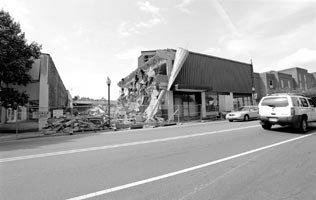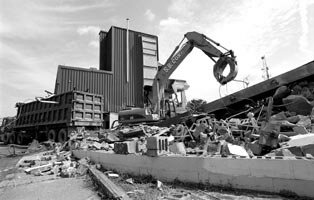Razing Main: Capshaw fells Peyton's place
An early West Main street auto dealership now part of band manager Coran Capshaw's voluminous holdings began its crumble into oblivion on Thursday, August 26.
"The building is magnificent," says fellow real estate mogul Gabe Silverman. "It's a beautiful building, under the skin."
That 1960s or 1970s skin– marked with the likeness of 1980s TV dad Bob Saget (in a delightfully absurd graffiti episode)– was peeled away late last week by employees of Richmond demolition company S.B. Cox Inc., which began by removing glass and siding to create giant holes in the building at the corner of Ninth and West Main.
"Once we get some equipment there, it won't take but a couple of weeks," said a company representative on the second day of demolition. At press time, echoing jackhammers and bulldozers were creating a dusty haze stretching from the Big Mouth pizzeria to the Shear Power salon across the street.
All of this comes as no surprise to Paul Perry, who works at nearby C&R Auto Service. "There have been plenty of people wanting to build on it," says Perry, "but they had the structure checked, and the structure was weak. They've been working on it slowly– they had to remove some asbestos," he says.
And as for Capshaw's plans? "He was planning to go on up with it," says Perry, looking skyward.
The road to demolition has been long and winding. Back in 1996, while in the process of designating mile-long West Main a historic district, the City studied each building.
"I would have preferred not to see it demolished," says Joan Fenton, chair of the Board of Architectural Review, which in a report lauded the early auto dealership's sleek lines of concrete and steel.
"Council had final authority," says former city councilor David Toscano, "and Council decided, given the fabric of the street, that a building like that is not historic, and just is not contributing to the historic character of the street."
According to City tax records, the Main Street showroom was built in 1924. Around back, the garage-like service bay– with its distinctive spiral ramp– was added in 1958. Dealership owner Bradley Peyton died in 1998.
"I think the building was pretty obsolete," says Harry Tenney, who managed Peyton Pontiac until the mid-1980s, when the Colonial Auto Group purchased the dealership.
"It was in the central part of what was then the commercial center of the town," Tenney recalls. "Albemarle County hadn't even begun to develop, so it was pretty much a central location."
It wasn't all happy tailfins and chrome. The nearby railroad crossing along the Ninth Street side frequently caused traffic jams, and Tenney considered it an eyesore.
"It was difficult to heat, and it was difficult to cool," he says. "And it leaked like a sieve," he adds. "I don't think [Capshaw] could really do much with that building."
In its final years, the structure served as home to an auto upholstery business, but it spent its 21st century days serving as little more than storage space. In the year 2000, after scolding his first Jeffersonian design, the Board of Architectural Review smiled on a renovation presentation by architect Raymond Gaines that accentuated the commercial history of the structure.
Capshaw, who purchased the property for $1.67 million in late 2002, did not respond to calls by press time. But Toscano says he recalls Capshaw presenting plans for yet another mixed-use development, with underground parking, streetscape retail, and residential units. Whether those plans are still in the works is not clear.
"I'm just glad that something's going to be done with the property," says Tenney, "and hopefully it will be something that will be attractive and pleasant for the community."–with additional reporting by Hawes Spencer and Courteney Stuart

Peyton Pontiac on August 27

Peyton Pontiac on August 31
PHOTOS BY JEN FARIELLO
#